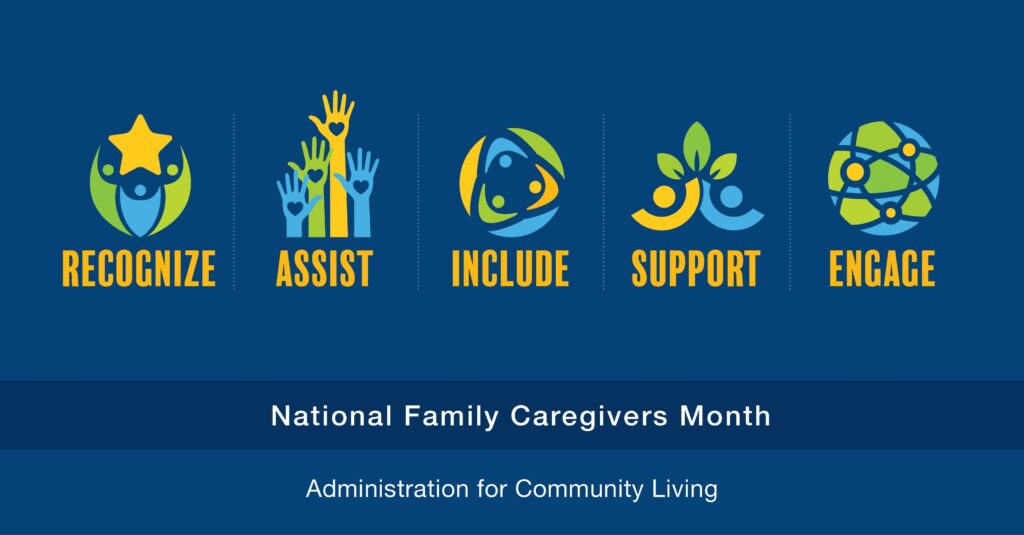- 1 in 5 US adults identify as caregivers (53 million or 21.3% of US adults)
- 10% are enrolled in college or other classes
- 89% are taking care of a relative
- 10% of grandparents are taking care of one or more grandchildren
- 40% live with the person they care for full time
- 24% care for 2 or more people
- 27% help someone with a mental illness
Families are the primary source of support for older adults and people with disabilities in the U.S. National Family Caregivers Month is a time to recognize and honor family caregivers across the country. It offers an opportunity to raise awareness of caregiving issues, educate communities, and increase support for caregivers.
The national observance is spearheaded by Caregiver Action Network (CAN), a nonprofit that provides free education, peer support, and resources to family caregivers. This is a time to recognize and honor family caregivers across the country.
Many caregivers work and also provide care, experiencing conflicts between competing responsibilities. Research indicates caregiving also takes a significant emotional, physical, and financial toll. With nearly half of all caregivers over age 50, many are vulnerable to a decline in their own health. Studies show that coordinated support services can reduce caregiver depression, anxiety, and stress, and enable them to provide care longer, which avoids or delays the need for costly institutional care.
There are over 53 million Americans who are unpaid caregivers to family, friends, and neighbors. Twenty-seven percent or nearly a third of adult caregivers are helping someone with a mental illness.
Caregiving can often have a significant impact on the life of the caregiver in more ways than one. It can make maintaining their physical and mental health more difficult and may put a strain on work and social life. It’s important for caregivers to take care of their own mental health.
Supporting caregivers with information and resources can help them maintain their mental health and better serve loved ones with mental illness.
Common Stressors
- Little to no personal time
- Family discord with care recipient as well as other members of the family
- 14% are more likely to report high difficulty finding affordable services
- Dealing with complex emotions
- 21% of caregivers taking care of a person with mental illness are more likely to feel high emotional stress themselves
- 1/3 of those caring for people with bipolar disorder report significant symptoms of depression
- Not living up to your own expectations
- 11% say they didn’t receive any training for the job
- Cultural expectations
- 7% of caregivers feel they have been discriminated against at work because of their role
How to Take Care of the Caregiver
- Talk to someone about your emotions and feelings and stresses
- Ask for help when you need it
- Get enough sleep
- Take time for yourself
- Exercise
- Turn to your faith for comfort
- Meditate
CPR and First Aid Training
Another beneficial step for a caregiver to take is our CPR and First Aid Class. With the training provided in the class, the caregiver gains confidence that they can respond to emergencies quickly and correctly.
RESOURCES
Administration for Community Living
- Support programs
- Supporting Grandparents Raising Grandchildren
- LongTermCare.gov
- Finding Local Services
- Caregiver Action Network
Mental Health America



Leave a Reply